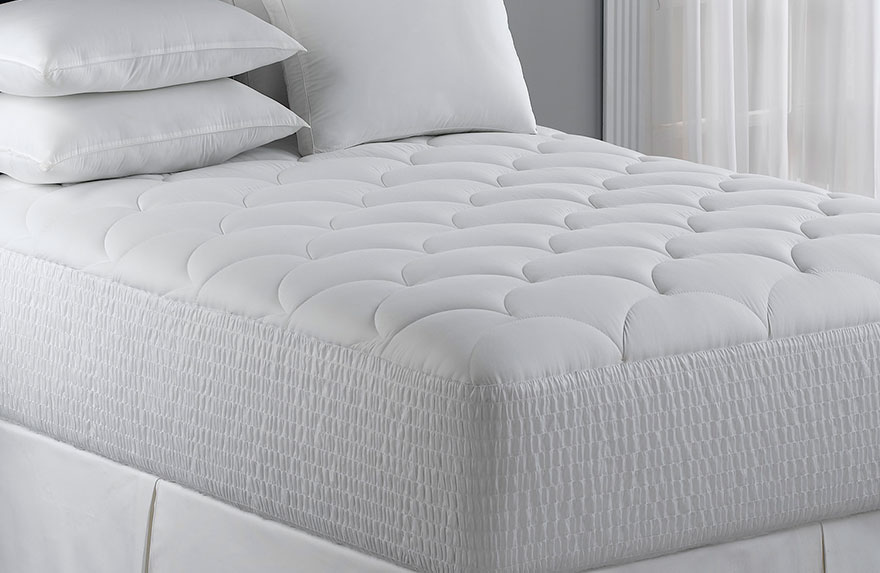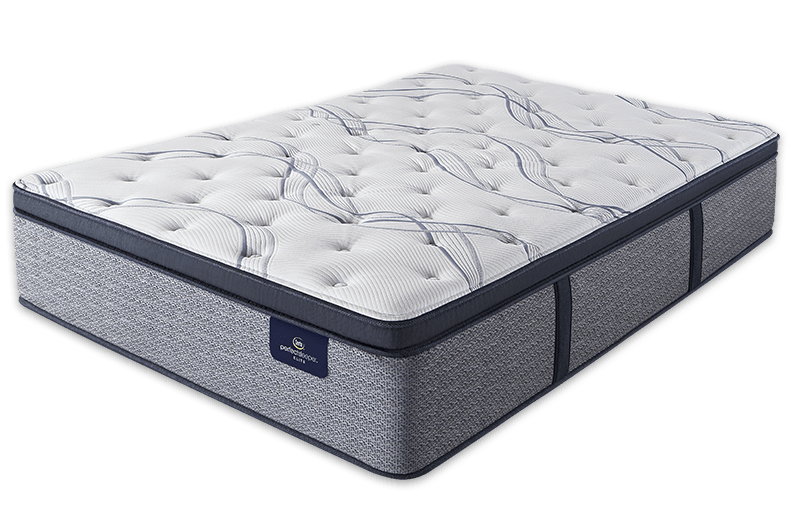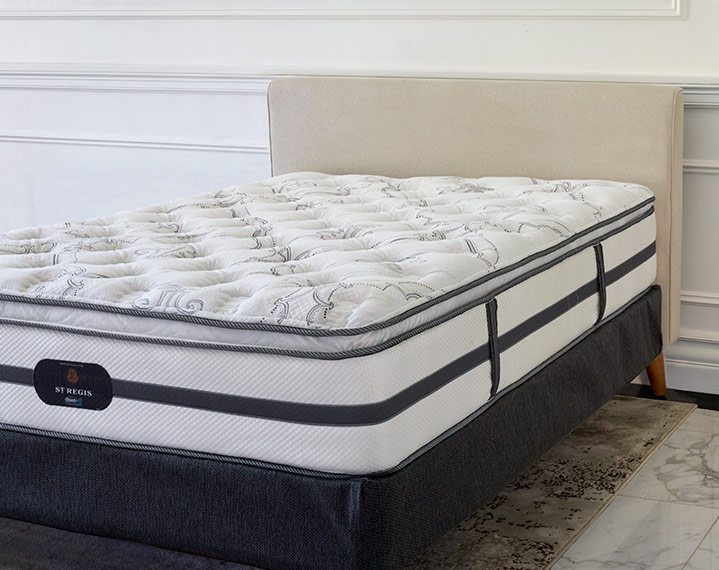
The Definitive Guide to Buying a Mattress
Replacing your mattress can be exhausting. Navigating the stores and websites, debating between foam and springs, and determining how much to spend can leave you feeling like you need a good nap.
Instead, skip the stress and follow these tips from Lexie Sachs, Senior Textiles Analyst at the Good Housekeeping Institute, that will help you navigate the world of mattresses.
Where to Shop for a Mattress
Laying down in the store isn’t the only way to go anymore. New mattress-in-a-box companies have won over thousands of customers with convenient shipping and free trial periods. Here’s what you need to know about both.
Shop in the store if…
Go the traditional route if you want to choose from a greater variety and feel the mattress before buying it. Most stores will also offer removal of your existing mattress. The downside is it can feel overwhelming and it’s harder to compare prices to know if you’re getting a good deal.

A big mistake is rushing the decision by quickly lying down on many different mattresses to find the one that feels best. If you’re going to invest in a mattress, take the time to recline for a while (at least 10 minutes) and make sure you don’t feel any pressure or pain.
In a mattress store, you should never pay full price. Always shop the sales, and don’t be afraid to negotiate with the salesperson.
Shop online if…
This newer route offers a great alternative for people who hate shopping for mattresses because there are less options to compare and no salesmen to deal with. These mattresses generally arrive in a box at your doorstep within a few days and include free shipping and a money-back guarantee (even if you simply don’t like the mattress!) so there’s minimal risk. The downsides are that you typically have to set it up yourself and deal with getting rid of your old mattress.

Online, the price is usually final, but it doesn’t include markups for being sold at a physical store.
How to Choose Your Perfect Mattress
There are three common types of mattresses: innerspring, foam, and adjustable. There’s no one “right” material to choose, but foam materials have shot up in popularity, especially with online retailers. Beyond the types of mattresses, you’ll need to think about a few other factors. From sleep style to negotiating with a bedfellow, here’s what to look for based on your needs:
If you like a bed with bounce
Innerspring mattresses have that familiar bouncy feel. Interconnected coils are extra-durable, but individual “pocketed” coils, each covered with fabric, reduce the ripple effect that happens when someone on one side of the bed moves.
If you prefer a firmer base
Memory foam and/or latex mattresses have much less spring. To determine quality, look at the density and thickness of the foam, which will determine how deep you’ll sink. The newer, online mattresses generally use several different layers of foam, with heavier ones on the bottom for support and lighter, cooler kinds on the top for comfort.
If you want a plush top
Innerspring mattresses typically have either a fiberfill or foam outer layer, covered in quilted ticking. But even if you want an uber-plush feel, don’t be swayed by a thick-looking pillowtop as it can compress over time. It’s often best to choose a firmer, well-quilted mattress, and then cover it with a replaceable mattress topper.
If you like to change it up
Consider an air-filled mattress, like Sleep Number, which has a remote that controls how much air is inside. Two side-by-side chambers allow you and your partner to customize the mattress firmness separately. There are also foam mattresses (like the ones from Layla) with soft and firm sides, so you can just flip it over as needed, and modular designs that let you move around the springs on the inside.
If you sleep on your side
You’ll want a surface that will support your body weight, and conform to your shape. Innersprings may have more pressure relief than some foam or latex mattresses, but a soft foam mattress or one with built-in pressure relief points around the shoulders and hips can work for side sleepers, too
If you sleep on your stomach
The last thing a stomach-sleeper probably wants is an enveloping memory foam — it would feel smothering! Instead, a firmer bed will provide the best support. Consider a firm foam, dense innerspring, or air-filled mattress.
If you sleep on your back
You’ll want something in the middle — a surface that supports, but has some give so your spine is kept in a healthy alignment. You’ll find happiness with any of the mattress types, but you should do your best princess-and-the-pea impression to see what feels best to you.
If your partner tosses and turns all night
Consider an innerspring mattress with pocketed coils, or memory foam, latex, or a dual-chamber air-filled mattress. Medium-firm picks will all have good “motion isolation.” But remember, these models could actually be less comfortable on the body of a restless sleeper, as there’s little forgiveness against one’s movements.
If you and your partner’s preferences don’t match
The air-filled mattresses with dual chambers can help, or check out the online mattress company Helix. Each person can fill out a questionnaire and have a side customized based on the responses.
If you sleep hot
Manufacturers can get carried away with claims about cooling properties, especially when you consider all the layers (protectors, toppers, sheets, and so on) that go on top of the mattress. That said, foam or latex can hold in body heat, especially if they’re very soft and a lot of your body sinks in. Newer technology helps alleviate this issue and you can always accessorize your bed with toppers and sheets that offer cooling benefits.
If you have allergies
Foam and latex are both inherently antimicrobial and resistant to dust mites and mold. If you opt for innerspring or air topped with fiberfill, be sure to encase it in an allergen-resistant cover to keep irritants at bay.
If you have back pain
Memory foam and/or latex is best for those with back pain since it molds to your body for support.
If you’re concerned about chemicals
Look for foams certified by CertiPUR-US as well as certifications for other materials like GOLS for latex or Oeko-Tex for other fabrics to feel more confident about your purchase.
If you can’t decide what matters most
Some savvy manufacturers make a hybrid-style mattress that combines the buoyancy of an innerspring core with the motion isolation of memory foam. It’s a best-of-both-worlds option that can satisfy many partner disputes and sleeping styles.
How and When to Replace Your Mattress
Always check the return policy. You may get a partial refund if you bought it in a store, but online mattress companies often arrange to pick it up for a local charity and will give 100% of your money back. Make sure you can test out a new mattress for a month risk-free; this way you can get used to it before making a decision.
A longer warranty may not promise a certain lifespan. if you read the fine print. If the mattress is stained because you didn’t use a mattress protector, or if you don’t use a matching foundation (like a box spring) beneath the mattress, it could invalidate the warranty.
Mattresses last five to 10 years as a general rule. However, you should decide when it’s time to replace your mattress based off of other warning signs. Are you waking up sore? Is your mattress feeling lumpy? Do you sleep better on other mattresses, like at a hotel? These are all signs that it’s time to go shopping. Don’t forget to extend the life of your new pad by using a mattress protector, which can keep out keep out dust, allergens, spills, and other hazards.